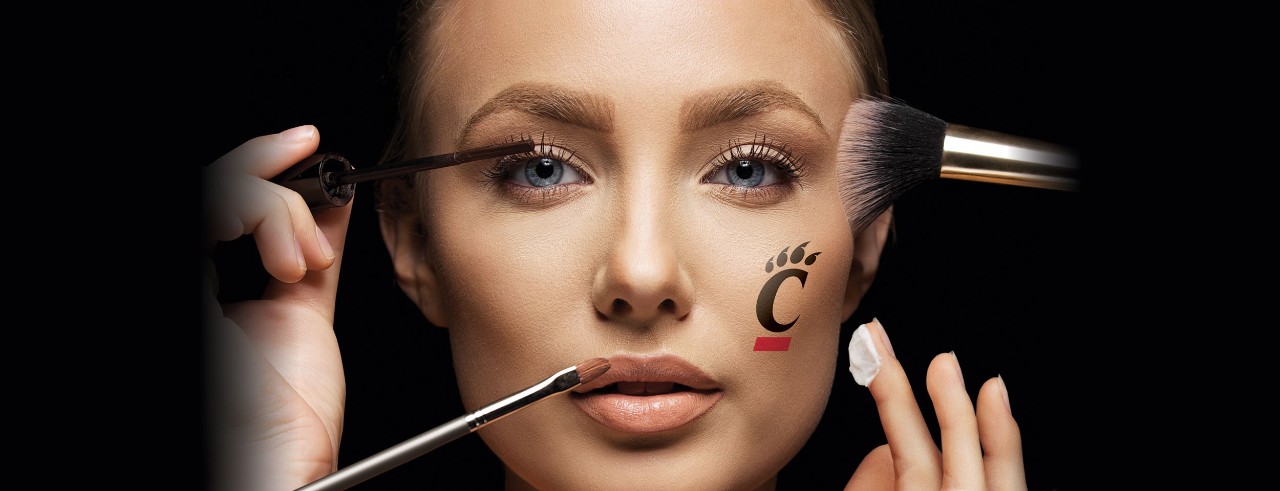
The beauty of teaching 'skin-deep' research
UC graduates advancing the field of cosmetics with cleaner products and new scientific revelations
Few at UC are surprised to hear that alumna Cynthia Johnson is making a name for herself in her field by creating environmentally friendly cosmetics.
The 2018 graduate of UC’s James L. Winkle College of Pharmacy’s master’s in pharmaceutical sciences program will receive the Green Star Award at the Society of Cosmetic Chemists’ annual scientific meeting Dec. 17.

Cosmetic chemist Cynthia Johnson
Johnson, a chemist and formulator for the cosmetics manufacturer C-Care in Baltimore, Maryland, is being recognized for the development of a cleanser that contains about 3,600 strawberry seeds per 3.5-ounce pouch. The seeds act as a natural exfoliant to remove dead skin cells and help to unclog pores. The cleanser also contains blue light protection, a barrier element that protects the skin from rays that emanate from computer screens, laptops and cellphones.
Johnson’s award-winning cleanser is among several products she began formulating for a line of superfruit cosmetics while working on her UC capstone project to earn her master’s degree in pharmaceutical sciences with an emphasis in cosmetic science.
“Cynthia is extremely passionate about creating novel cosmetic formulations using greener and natural materials,” says Ananth Kavssery, UC’s cosmetics science program director and Johnson’s former advisor. “Her master’s dissertation was on natural and biodegradable alternatives to microplastics in skin care. I am sure we will see many more cosmetic and personal technologies based on natural and environmentally friendly ingredients from her in the coming years.”
Johnson says that perhaps the most prominent takeaway from her graduate education at UC was the coursework on preservatives, and the public perception of what is and isn’t considered harmful.
“People say that they don’t want chemicals in their products, but not all synthetic ingredients are harmful and not all-natural products are safe,” she says.
For example, she cites Vitamin E as a natural product that is safe for the environment and human health, but if it oxidizes it is harmful to the skin.
Johnson also notes that a greater emphasis is being placed on blue light protection, and she wants to get in front of the industry efforts to develop these products since she believes, “it’s going to be the talk of the town in the cosmetics industry.”
Another Bearcat awarded

Liyuan Ji, 2019 graduate of the master’s in pharmaceutical sciences program
In addition to Johnson, another UC grad, Liyuan Ji, a 2019 graduate of the master’s in pharmaceutical sciences program, will receive the Young Scientist Award from the Society of Cosmetic Chemists for her research paper entitled “Mechanistic Understanding of the Effects of Air Pollution on Human Skin Health Using Innovative Human Skin Explant Mode.”
Ji’s paper examines what happens to our skin through simply existing in a world filled with different types of air pollutants and what types of protections we might need.
“Everybody knows that pollution has proven to be bad for the skin, but no one knows to what extent,” Ji says, adding that her research found cell death occurred across the board when skin samples were exposed to pollutants but that certain body washes acted as protectants.
Ji’s research was a collaboration with Cincinnati-based consumer products giant Procter & Gamble to study the impact of air pollution on skin health, such as skin hydration and aging, using cultured human skin cells. The goal is to obtain essential data that reflect the changes in the life of skin cells after exposure to pollution for the future skin care product development.
After graduating with her master’s in pharmaceutical sciences, with tracks in both cosmetic sciences and bio-membrane sciences, Ji started working as a research scientist at Biometrix clinical testing and research firm in San Francisco, California.
“The degree program gave me a more in-depth understanding of my current role and the process of laboratory discovery,” she says.
Next Lives Here, the University of Cincinnati’s strategic direction, defines our moment and our momentum. More nimble and more robust than a plan, Next Lives Here announces our vision to the world — to lead urban public universities into a new era of innovation, impact and inclusion.
Related Stories
Before the medals: The science behind training for freezing mountain air
February 19, 2026
From freezing temperatures to thin mountain air, University of Cincinnati exercise physiologist Christopher Kotarsky, PhD, explained how cold and altitude impact Olympic performance in a recent WLWT-TV/Ch. 5 news report.
Discovery Amplified expands research, teaching support across A&S
February 19, 2026
The College of Arts & Sciences is investing in a bold new vision for research, teaching and creative activity through Discovery Amplified. This initiative was launched through the Dean’s Office in August 2024, and is expanding its role as a central hub for scholarly activity and research support within the Arts & Sciences (A&S) community. Designed to serve faculty, students, and staff, the initiative aims to strengthen research productivity, foster collaboration, and enhance teaching innovation. Discovery Amplified was created to help scholars define and pursue academic goals while increasing the reach and impact of A&S research and training programs locally and globally. The unit provides tailored guidance, connects collaborators, and supports strategic partnerships that promote innovation across disciplines.
Blood Cancer Healing Center realizes vision of comprehensive care
February 19, 2026
With the opening of research laboratories and the UC Osher Wellness Suite and Learning Kitchen, the University of Cincinnati Cancer Center’s Blood Cancer Healing Center has brought its full mission to life as a comprehensive blood cancer hub.
